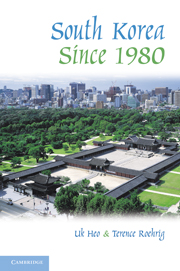Book contents
- Frontmatter
- Contents
- Dedication
- 1 Politics, Economics, and Foreign Relations before 1980
- 2 From Dictatorship to Democracy
- 3 Democratic Consolidation and Social Change
- 4 Economic Development and Financial Crisis
- 5 Economic Reform and the Korea–U.S. Free Trade Agreement
- 6 Inter-Korean Relations and the North Korean Nuclear Crisis
- 7 The South Korea–U.S. Alliance
- 8 South Korea and the Regional Powers
- Selected Bibliography
- Index
- References
2 - From Dictatorship to Democracy
Published online by Cambridge University Press: 05 June 2012
- Frontmatter
- Contents
- Dedication
- 1 Politics, Economics, and Foreign Relations before 1980
- 2 From Dictatorship to Democracy
- 3 Democratic Consolidation and Social Change
- 4 Economic Development and Financial Crisis
- 5 Economic Reform and the Korea–U.S. Free Trade Agreement
- 6 Inter-Korean Relations and the North Korean Nuclear Crisis
- 7 The South Korea–U.S. Alliance
- 8 South Korea and the Regional Powers
- Selected Bibliography
- Index
- References
Summary
The assassination of Park Chung-hee shocked the country and came at a difficult time. After years of solid growth, the economy was in the midst of a steep decline that was due in large measure to the 1979 oil price shock, the second in the decade, that once again doubled the price of oil. In addition, South Korea's debt skyrocketed, and banks were reluctant to provide additional loans that were desperately needed to get through this period. With the shaky economy and uncertain political times following Park's assassination, banks were unsure that South Korea offered a stable investment opportunity. Inflation rose to more than 30 percent, and labor disputes increased, adding to the economic uncertainty. The new government of President Choi Kyu-ha faced some daunting problems, and he had little time to produce results. In the end, he did not prove up to the task and failed to be the strong, decisive leader South Korea needed to weather this storm.
Return to Military Rule: Chun Doo-hwan and the Rolling Coup
While Choi Kyu-ha was working to solidify the new civilian government in the wake of Park's assassination, others had been planning a different course of action. In 1979, Major General Chun Doo-hwan was appointed to head the Defense Security Command (DSC), the most powerful of South Korea's military intelligence agencies. Because the DSC had jurisdiction in dealing with military coups and revolts, Chun was given the responsibility of investigating Park's murder.
- Type
- Chapter
- Information
- South Korea since 1980 , pp. 28 - 50Publisher: Cambridge University PressPrint publication year: 2010

